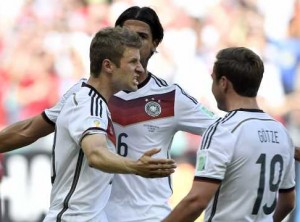 Germany became the first European team to win the FIFA World Cup on South American soil, beating Argentina 1-0 in the final thanks to Mario Gotze’s extra time goal at the Maracana Stadium here Sunday.
Germany became the first European team to win the FIFA World Cup on South American soil, beating Argentina 1-0 in the final thanks to Mario Gotze’s extra time goal at the Maracana Stadium here Sunday.
The last time the Germans, playing as West Germany, lifted the World Cup trophy was in 1990 beating Diego Maradona led Argentina with the same scoreline in Rome.
The two teams were locked 0-0 after 105 minutes of play and took two German substitutes to break the deadlock and give Germany their fourth World Cup triumph.
Andre Schurrle made inroads down the left hand side, and lofted in a neat cross towards the near post. Gotze took it excellently on his chest and with time and space to move, he brilliantly found the back of the net in the 113rd minute.
Germany and Argentina could not be separated after 90 minutes of play. For the third time in a row the FIFA World Cup final went into extra time after the two teams were locked 0-0 at full-time.
The last two World Cup finals went to extra time. In 2006 saw Italy defeated France in penalties, while in 2010 Andres Iniesta scored with the clock running down to clinch the trophy for Spain against the Netherlands.
But the Germans went into extra time with all the momentum after going close on more than one occasion in the final 10 minutes.
The second half was a let down after an intriguing opening period. The two teams could not find the breakthrough with Argentina having the better chances of the two.
The score might have been goalless at halftime, but it wasn’t a bore by any means though. Both sides clearly had their own designs on how they wanted to win the game.
Germany, as ever, dominated possession, patiently probing their way through. Meanwhile, Argentina were happy to tempt them forward and use their pace to get in behind.
Christoph Kramer called in to replace Sami Khedira at the last second, lasted just over half an hour before leaving the pitch in a daze, following a head injury.
Argentina have had their own bad luck at the other end. Higuain missed a one-on-one and saw a goal correctly ruled off for offside.
Lavezzi was also blocked pretty much on the goal line from turning in a Lionel Messi cross. A lot of close shaves, but neither keeper were beaten (legally) yet.
The first half nearly ended in all kinds of dread for Argentina. A Benedikt Howedes header at the death that left a dent in the post was just shy of hitting the target.
In the 23rd minute when German midfielder Toni Kroos made an incredibly poor header backwards, intended for goalkeeper Manuel Neuer.
The back pass, though, went straight to forward Higuain, who had acres of space but pulled his shot wide.
The second half was a much tighter affair with both teams slowing down the pace of the game.
Argentina still looked the more purposeful side in the second half but poor play in the final third saw them fail to beat Neur.
Germany, though, ramped up the intensity as the game progressed and should have taken the lead but Romero came to the rescue of the Germans.
Extra time started at break neck speed with Andre Schurrle testing Romero early on. There were signs of fatigue all over the pitch though.
Substitute Rodrigo Palacio missed another easy chance for Argentina failing to even hit the target from five yards out.
Argentina midfielder Angel di Maria failed to return to the starting lineup. The Real Madrid midfielder sustained a thigh injury in Argentina’s quarterfinal win over Belgium and missed the semifinal against the Netherlands.
There had been talk that Angel di Maria, who scored the late winner in the round-of-16 victory against Switzerland, may be risked for the final by coach Alejandro Sabella, but Sabella finally decided to keep faith in the team that saw off the Oranje with Enzo Perez keeping his place.
Germany are the champions
—